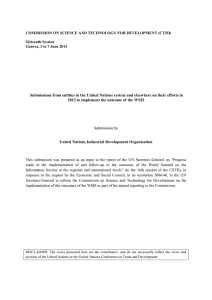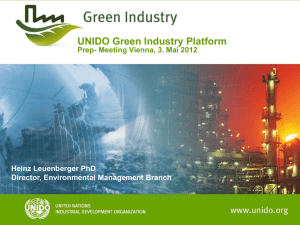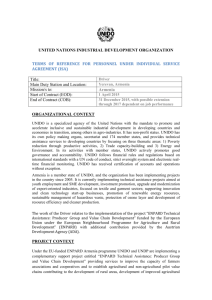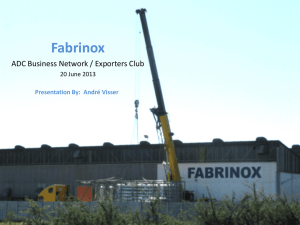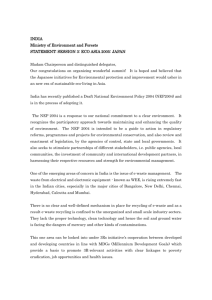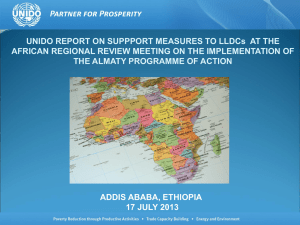COMMISSION ON SCIENCE AND TECHNOLOGY FOR DEVELOPMENT (CSTD) Fourteenth Session
advertisement
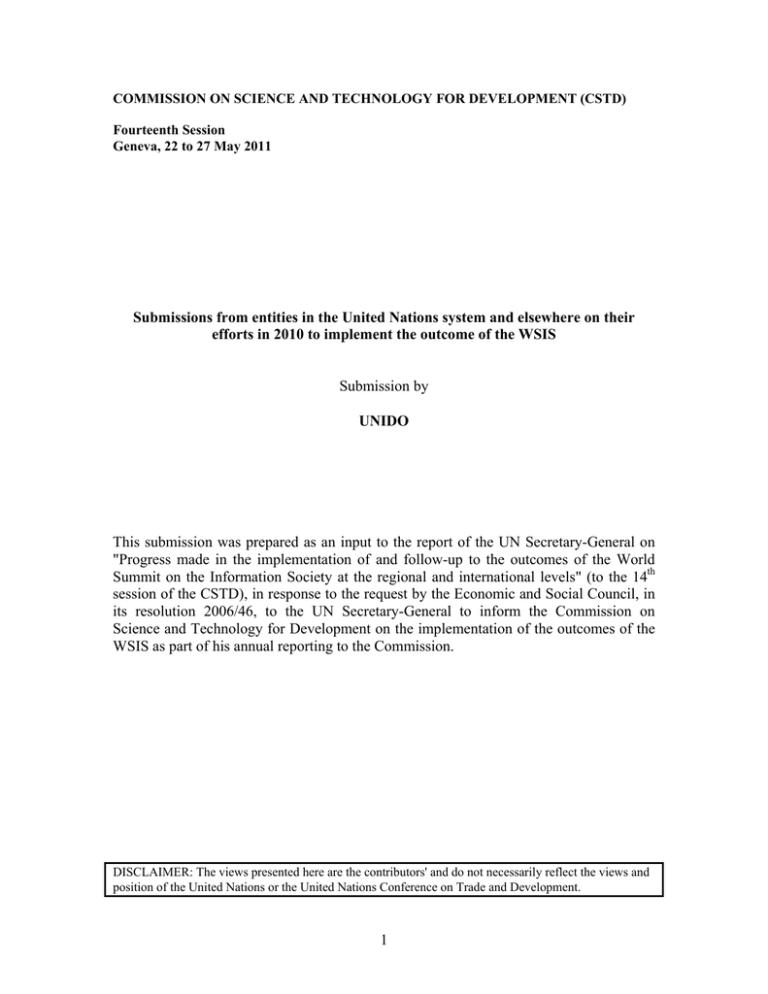
COMMISSION ON SCIENCE AND TECHNOLOGY FOR DEVELOPMENT (CSTD) Fourteenth Session Geneva, 22 to 27 May 2011 Submissions from entities in the United Nations system and elsewhere on their efforts in 2010 to implement the outcome of the WSIS Submission by UNIDO This submission was prepared as an input to the report of the UN Secretary-General on "Progress made in the implementation of and follow-up to the outcomes of the World Summit on the Information Society at the regional and international levels" (to the 14th session of the CSTD), in response to the request by the Economic and Social Council, in its resolution 2006/46, to the UN Secretary-General to inform the Commission on Science and Technology for Development on the implementation of the outcomes of the WSIS as part of his annual reporting to the Commission. DISCLAIMER: The views presented here are the contributors' and do not necessarily reflect the views and position of the United Nations or the United Nations Conference on Trade and Development. 1 Information for the follow-up to the World Summit on the Information Society Input from UNIDO Ongoing Programmes and Projects in 2010 a) UNIDO's Business Information Centres (BIC) Programme UNIDO’s BIC Programme is an impact-oriented, pro-poor initiative that caters to the needs of rural entrepreneurs. The BICs provide ICT-based information, training and Internet access to MSMEs on a commercial basis. Other major benefits for rural entrepreneurs are ICT support, entrepreneurial advice and unprecedented access to new markets, technologies and services. With the support of UNIDO, BICs sign cooperation agreements with institutions that provide information content. As a pilot project, eight BICs have successfully been launched in rural Uganda. Numerous countries have since requested UNIDO’s assistance in replicating and tailoring such centres to their local needs. The programme received the “Africa Investor Award 2007” in the category best SME development initiative. b) UNIDO's Renewable Energy Powered Business Information Centers (REBICs) Based on the significant expertise accumulated in the area of private sector development and renewable energy solutions, UNIDO has established a joint initiative to link renewable energy solutions for productive capacities in rural areas. UNIDO has initiated the establishment of renewable energy powered business information centres (REBICs) in Uganda by linking UNIDO’s business information centre methodology which provides entrepreneurship skill services and ICT training to rural communities with sustainable and reliable energy solutions. Based on renewable sources of energy such as solar, biomass, wind and small hydropower technologies, UNIDO will offer an innovative solution to provide reliable energy access and productive capacities for SMEs in rural areas. c) UNIDO's Refurbished Computer and Electronic Waste Programme In 2008, UNIDO and Microsoft launched the computer refurbishment programme. The main goal of the programme is to provide consumers at the bottom of the economic pyramid as well as entrepreneurs with access to affordable quality hardware, and to take care of the entire life-cycle of used computers in an 2 environmentally safe way. The project contains a full life-cycle solution which includes the local disassembly of PCs at the end of their useful life into reusable components, which are either resold, locally recycled or exported back to partners in Europe. Based on the successful pilot project in Uganda, in 2009 computer refurbishment projects have commenced in Tanzania and Trinidad and Tobago as well. d) UNIDO's Local software initiative in Uganda With a three-way partnership between UNIDO, Microsoft and the Government of Uganda, the local software industry initiative for Uganda was launched in September 2007. The objectives are to provide opportunities for ICT graduates to be employed in the information economies, as well as to spur innovative software solutions in local languages tailored to the native needs. Stimulated local software industry can bring new opportunities for innovation, business process outsourcing services, and industrial development. To this end, it is planned to establish the first local software development centre in East Africa in 2010/11 to act as a centre of excellence and incubator involving academia, industrial associations, the private sector and relevant public institutions. e) UNIDO-HP Global Partnership Programme - Entrepreneurship and IT Training In May 2008, UNIDO and Hewlett-Packard (HP) joined hands to implement the Learning Initiative for Entrepreneurs Programme (HP LIFE), developed my MEA-I, Geneva, in Africa and the Middle East. The entrepreneurship and IT training programme is accessible online and offline and teaches students, potential and existing entrepreneurs relevant business skills with the use of technology to start, run, grow and sustain a business. LIFE teaches entrepreneurs IT solutions for daily business challenges in the areas of marketing, operations, communication and finance. So far, the partnership has set up 33 LIFE training centres in 11 countries, certified 143 trainers and trained more than 18,000 students. This year’s implementation constitutes the inclusion of Brazil, China and India to enable a global outreach. UNIDO and HP are working together to promote innovative uses of ICT to support entrepreneurship, help encourage economic development and create new business opportunities. Electronic Waste (e-Waste) Threat and opportunity Today, the amount of e-waste is rapidly growing in developing countries as they join the global information society. At present electronic appliances are rarely disposed of 3 in an adequate manner and there is little regulation in place, creating hazards for local populations, as well as for the environment. While the environmental services industry has developed into a multi-billion dollar industry worldwide, it is largely absent in developing countries. This is both a missed business opportunity and a threat. a) Workshop - ‘Developing Green Industries for Responsible End of Life Solutions of Electronic & Electric Equipment in Africa’ To discuss the challenges of e-waste management in Africa, UNIDO invited members of the private sector, UN agencies, academia and international initiatives and framework to the workshop, ‘Developing Green Industries for Responsible End of Life Solutions of Electronic & Electric Equipment in Africa’, which took place in Vienna in November 2010. The main aim of the workshop was the elaboration of a coordinated strategy on e-waste management in Africa and the scoping of concrete activities to provide technical assistance to developing countries on integrated and environmentally sound management of e-waste. To achieve synergies, it was decided to develop a joint strategy on e-waste to translate e-waste management challenges into sustainable business models. b) E-waste assessment study - Tanzania Moreover, within the framework of the ‘UNIDO e-waste initiative for Tanzania’, an ewaste assessment study was conducted by the Cleaner Production Centre of Tanzania in collaboration with EMPA of Switzerland. The overall objective of the study was to obtain a reliable overview of the e-waste landscape in Tanzania, through a baseline study focusing mainly on computers and other IT equipment including mobile phones and TVs. The study showed that though the use of ICT equipment is still low in Tanzania, future computer mass flow trends based on linear and exponential growth indicate that the potential e-waste generation from computers will increase to 9,500 tons in 2015. c) Stakeholders’ Workshop in Dar es Salaam In collaboration with the Vice President’s Office and the Ministry of Communications, Science and Technology, UNIDO and Microsoft conducted a Stakeholders’ Workshop in Dar es Salaam in December 2010 to present the electronic waste (e-waste) study for Tanzania. The study was presented to stakeholders from the public and private sector to develop a sustainable e-waste dismantling facility within the framework of the UNIDO e-waste project. The objective of UNIDO’s e-waste programme is to foster the development of an environmentally sound e-waste recycling industry in developing countries. 4 For further information please contact: Ms. Barbara Kreissler Industrial Development Officer Business, Investment and Technology Services Branch UNIDO Tel.: + 43 1 260 26 3420 Email.: b.kreissler@unido.org www.unido.org/ict 5
